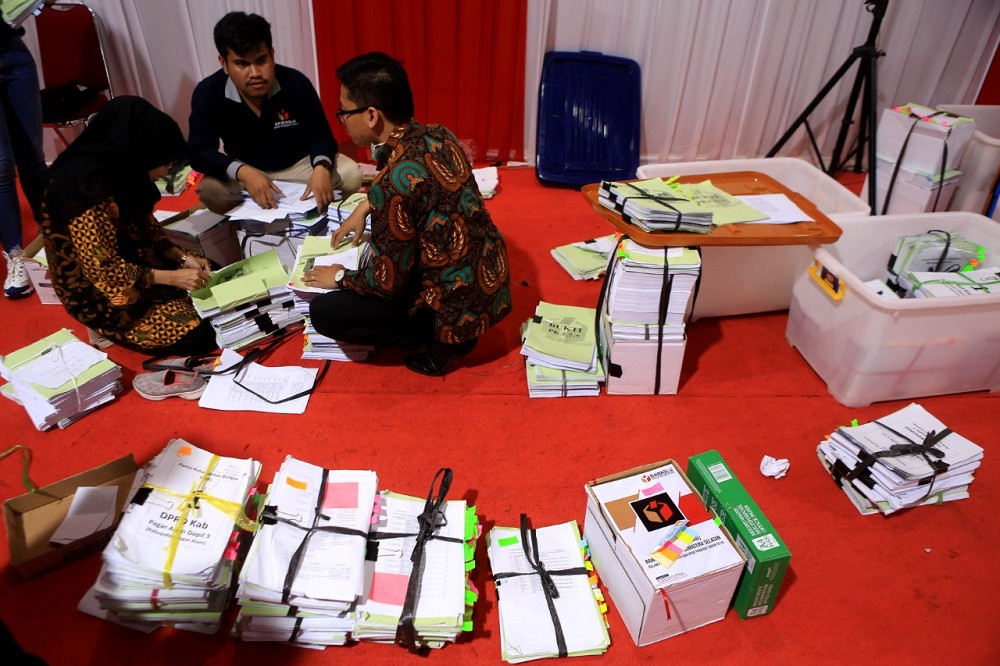Popular Reads
Top Results
Can't find what you're looking for?
View all search resultsPopular Reads
Top Results
Can't find what you're looking for?
View all search resultsBawaslu: 13 years of supervising elections
the complex electoral process requires election supervisors that are skilled and have the courage to carry out their duties in a fair manner.
Change text size
Gift Premium Articles
to Anyone
"The Court rejects the applicant's petition regarding the dispute over the election results of the 2019 Presidential and Vice Presidential Election." This was the Constitutional Court’s decision that capped a plenary hearing on Thursday, June 27, 2019, on the challenge filed by the Prabowo Subianto-Sandiaga Uno candidate pair against the results of the 2019 presidential election.
The court decision is 1,944 pages. Running a keyword search for "Bawaslu" produces 1,844 hits. In arriving at its decision, the Constitutional Court appeared to "contradict" the petitioner's argument that included results on electoral supervision, handling of violations and dispute resolution from the Elections Supervisory Agency (Bawaslu).
As regards Bawaslu’s supervisory role, Supandi, who chairs the State Administrative Chamber (TUN) at the Supreme Court, once compared the agency with a referee of a soccer match "who must make a decision over 2x45 minutes”.
“Whether it is right or not, a decision must be taken within the time frame," he said.
Supandi likened Bawaslu to a soccer referee because the agency administers its power in a detailed, straightforward manner. And like a soccer match, the agency uses a review process to make its judgments in a limited time.
A little historical reflection: Bawaslu, was originally called Panwaslu (Elections Supervisory Committee) when it was first formed in 1999. Panwaslu was merely needed to "justify" the electoral process in the political context of the time.
Its members came from various institutions, including officials of the judiciary, state prosecutors, police officers, community leaders, youths and academics. It is as if they were forced to work together over a short period to supervise the electoral process.
At that time, Panwaslu served as a mere "courier", producing recommendations for sending to other institutions. These recommendations might include improvements in electoral administration intended for the General Elections Commission (KPU) or a list of electoral violations for potential police enforcement.
Over time, the government, together with lawmakers, realized the need to strengthen supervision of the democratic electoral process. Through gradual regulatory reform, the organization’s structure was strengthened to establish Bawaslu as a permanent national institution on April 8, 2008. Meanwhile, the agency’s provincial branches (Bawaslu Provinsi) were established only in 2012, while its branches at the regency/municipal level were established in 2018.
The development of democracy in the country has allowed its citizens to directly elect their legislative representatives through an open and proportional system. Regional heads are no longer elected by the regional legislatures, but directly by the people.
Independent candidates were allowed to contest the regional elections, too. In this way, the complex electoral process requires election supervisors that are skilled and have the courage to carry out their duties in a fair manner.
In exercising its authority, Bawaslu has faced a series of controversies. During the 2019 legislative elections, for example, Bawaslu recommended a revote in Kuala Lumpur after the Malaysian police discovered prepunched ballot papers intended for postal distribution to 319,923 overseas Indonesian voters.
Bawaslu also recommended that the overseas polling committee reopen the polling station in Sydney, Australia, where many registered overseas voters could not exercise their electoral rights because the polling station was only open until 8 p.m. local time.
With regard to legislative candidates, Bawaslu challenged the KPU’s decision to ban former corruption convicts from contesting the regional elections, saying that the ban did not exist in the Regional Elections Law. The Supreme Court later decided in favor of Bawaslu and annulled the KPU’s policy.
In this context, the basic principle that Bawaslu upholds in supervising the elections is none other than electoral justice. The absence of a dispute resolution mechanism cannot deprive voters of electoral justice. Electoral justice also protects all citizens from potential electoral fraud.
Jesus Orozco-Henriques, et al. (2010) pointed out that electoral justice was no more than a means and a mechanism that a country provides to guarantee every action, procedure and related decision is in line with the electoral process under the existing legal framework. The aim is to protect or restore voting rights, as well as to enable citizens to file complaints over any violations of their voting rights, take it to court and get a fair verdict.
In the 13 years it has been supervising various Indonesian elections, Bawaslu has been required to prevent electoral irregularities, provide a public complaint mechanism and facilitate a fair and transparent resolution mechanism for public complaints in fulfilling its duties and authority.
Even with certain limitations, the agency can enforce appropriate penalties on violators that disrupt the electoral process under its objective to administer democratic elections with integrity as the common goal.
While Bawaslu may cause inconveniences for certain people in exercising its authority, all election supervisors understand that upholding electoral justice always carries a risk.
Happy anniversary, Bawaslu.
***
The writer is a member of the Elections Supervisory Agency (Bawaslu). The views expressed are personal.










